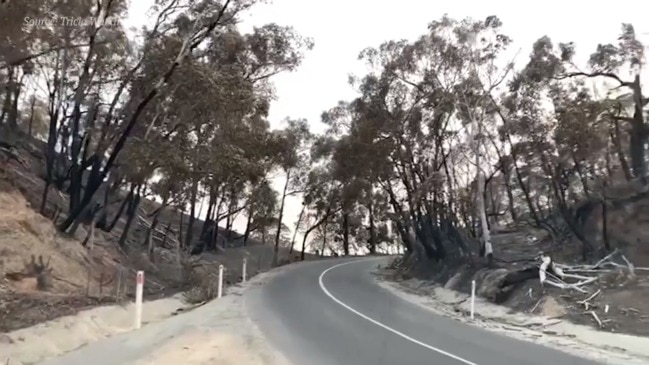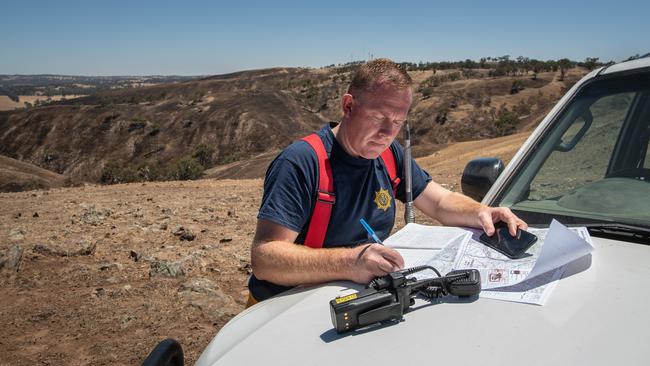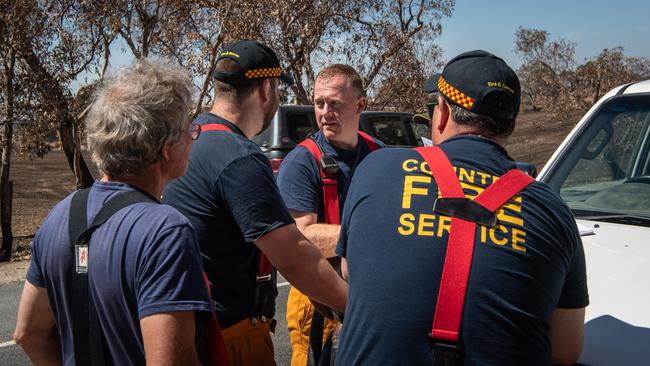Cudlee Creek bushfire clean-up has only just begun
He’s been a CFS volunteer since the age of 16, and now he is one of the main shot-callers in the Adelaide Hills. We spent a day with Nathan Watts as he reflected on the Cudlee Creek blaze and the clean-up ahead.

Bushfire Support
Don't miss out on the headlines from Bushfire Support. Followed categories will be added to My News.
- Shane Leahy lost his home but continued to fight fires
- Farmer shot video of her house burning in bushfire
- Before and after: Satellite images reveal extent of damage
The clean-up effort from the Cudlee Creek bushfire is proving to be a long and arduous task, as CFS volunteers continue to grapple with the fallout.
In the two weeks after the fire on December 20, firefighters tirelessly patrolled the fireground, extinguishing hotspots and helping victims recover from the devastation.
Crews are no longer actively patrolling the affected area, but firefighters have been called out as recently as Wednesday to douse flare-ups.
There’s also more work to be done for the CFS internally, as they work through repair jobs for their appliances and equipment, as well as replenishing stock at local brigades.
Heysen Group Officer Nathan Watts has remained hands-on in his approach to the clean-up process, directly helping his home community.

Despite being a partner in a busy Mt Barker real estate firm, Mr Watts has been on the fireground every single day since the fire began last month.
He grew up on a property in Harrogate, where “fire was a way of life”, and he knows many people directly affected by the Cudlee Creek blaze.
This week he has been speaking with landowners and helping them reconnect their water supplies.
Mr Watts, a keen traveller and fisherman, tells The Advertiser he was one of the main shot-callers when the fire was at its worst on December 20.
But, there were times when he wished he was in the thick of the action, instead of pulling the strings behind the scenes.
“A number of times we saw fire behaviour inconsistent with what we would have expected,” Mr Watts says.
“Being in a command vehicle means you don’t have the capacity to do something about the fire. You have to rely on having troops around you.”

He said there were moments when fellow CFS volunteers were caught up in flames, and all he could do was listen to the chaotic radio chatter in his four-wheel-drive.
“We had one of our appliances experience a burnover, where the fire has over run them,” he says.
“Of course, that is transmitted over the radio and, being at a distance from them and knowing there’s not much you can do is an absolute feeling of helplessness.”
Mr Watts made the decision to join the CFS at the age of 16 and has been with them ever since.
Now 38 years old and a father of two young children, Mr Watts is the Heysen Group Officer – encompassing many of the Hills’ brigades.

It is one of the more advanced and demanding volunteer roles in the CFS, and being one of the main decision-makers in life-or-death situations takes its toll, Mr Watts says.
“After any incident, regardless of how big or small it is, you’ll always go back and reflect and sometimes wish you made decisions differently.”
“We’re aware that every decision we make in a firefighting capacity has long lasting impacts for the community but also for the environment,” he says.

